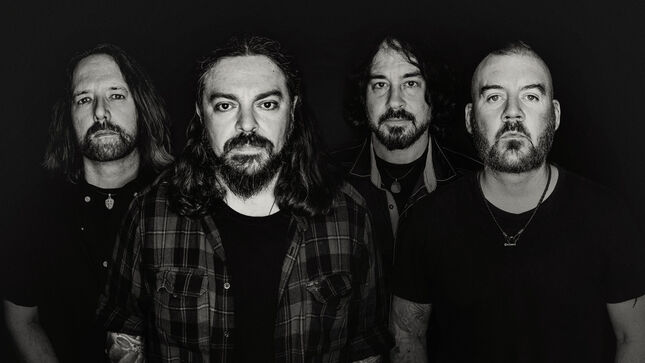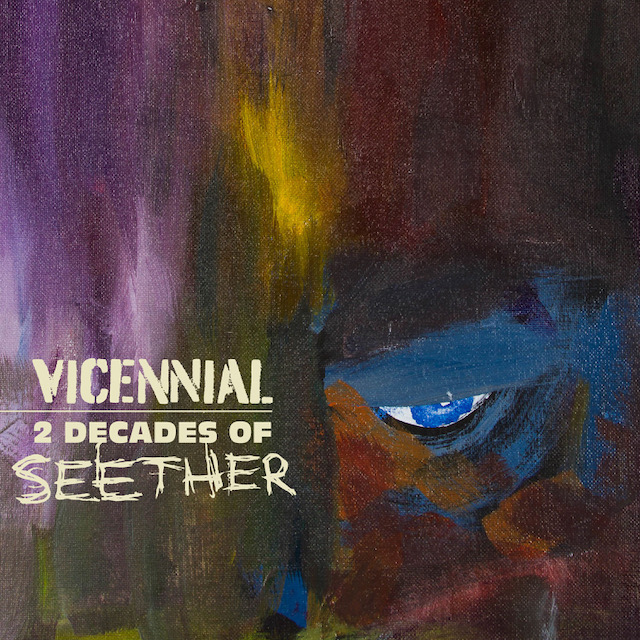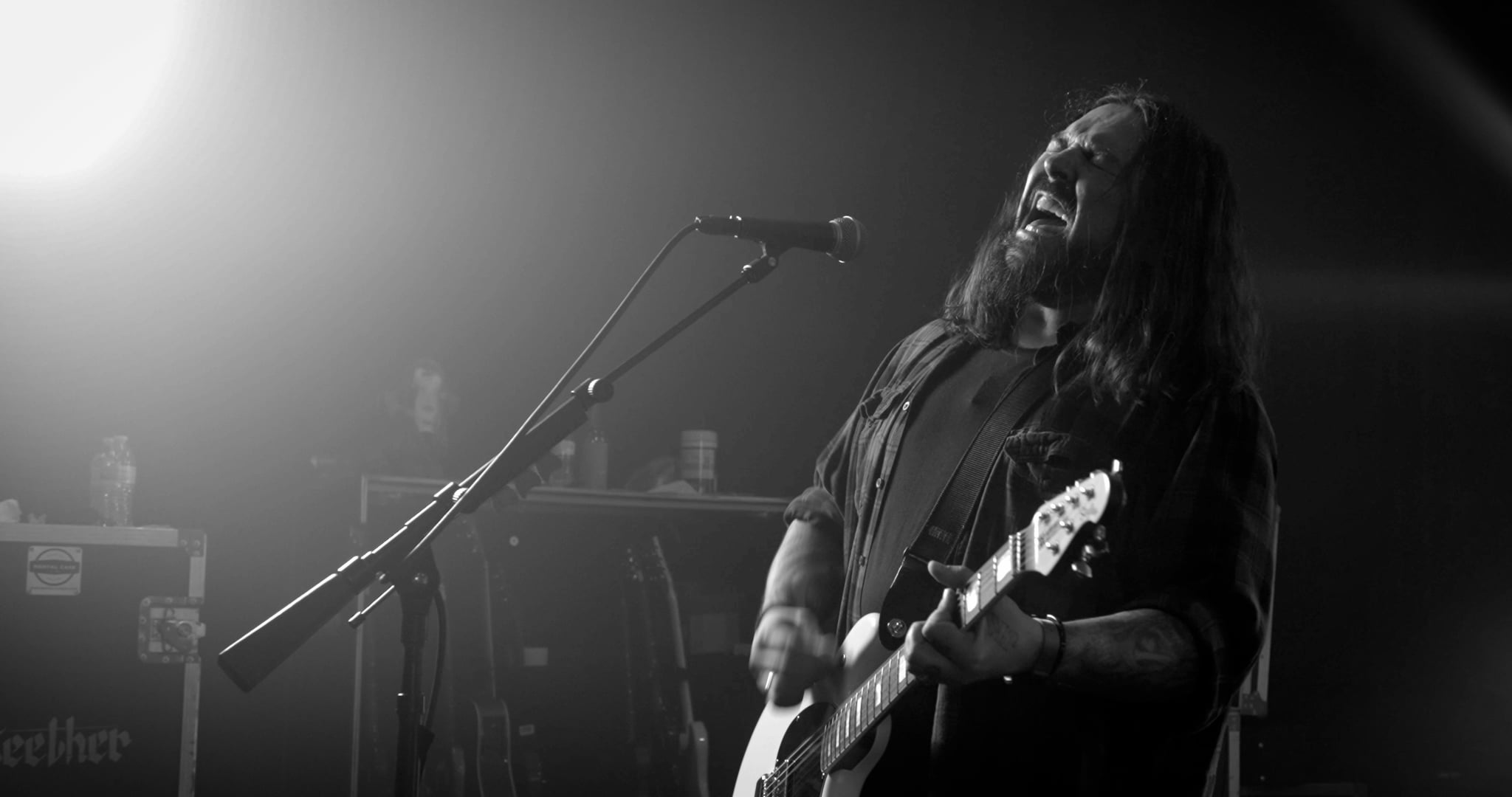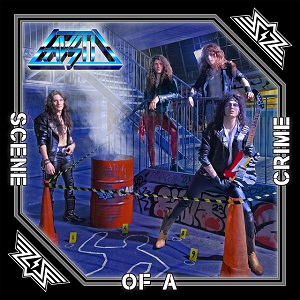SHAUN MORGAN Discusses 20 Years Of SEETHER, Record Label Battles, Embracing Deep Cuts, Love Of Grunge
November 3, 2021, 3 years ago

From South African upstarts to global, chart-topping success story, Seether have defied the odds and the rigours and crushing pressures of the music industry to become one of the preeminent touring hard rock acts in the world today.
Two decades into their perhaps improbable run atop rock’s pantheon of legitimate draws, and the band has released a career retrospective best of compilation, Vicennial: 2 Decades of Seether.
In commemoration of the momentous achievement for the band, founding member and guitarist/vocalist Shaun Morgan sat down with BraveWords for a deep dive into the history of the group and early days breaking into North America, diving into clashes with record labels, finding comfort in themselves and his love and the lasting influence of grunge.
BraveWords: It's pretty wild to think of this band in terms of two decades. Perhaps it’s because you continue to put out hit singles and tour prominently, you haven’t really had a dip or time away from the mainstream. Was it kind of a strange process to look back in this kind of lens at the band as a whole?
Shaun Morgan: “I mean, depending on which day you talk to me, some days it feels like it's been the blink of an eye. Other days it feels like it's been forever. The interesting thing is this; if you look at a lot of the songs on this compilation, it's mostly the stuff we play most often live because it's what people want us to play more. It's what we basically started out on and it's mostly the singles that did the best.
“It's kind of weird to think that this is our 20th year of living here in the United States now and coming up in January would have been here for a full 20 years, and we first moved over and everything changed. Everything from the accents we heard to the plugs you used to, the money you used to how you got around, everything was just completely flipped on its head. And at the time it was kind of overwhelming because we lived in Times Square as well, which by any metric is a sensory overload. We lived, I think, on the 60th floor, right in Times Square in these housing apartments and we were basically broke. It was this very exciting time for us because I think I was twenty three, Dale was twenty two. We had a drummer who was slightly older. I think he was approaching 38 at the time, and here we are living in New York City. Pretty soon after 9/11 happened. So there was all this weird energy in there, but it's very exciting for us. We get in the limo, we go to this apartment, we rehearse for a couple of weeks and then we suddenly get moved to L.A. and it's like OK we'll do that and we'll see what happens and we start recording. We're in there. It's like this is really amazing. Let's hope this lasts. Let's make this first album and hope for the best and see if we can make it and maybe five or six years from now we'll just go back home and we'll pick up where we left off.
“And it's been amazing that we can still be here. Especially when you consider there've been a lot of bands that we've toured with that no longer exist or have fallen away into some sort of obscurity, which is sad for us and for them to see that happen to them, obviously. But I'm pretty happy and obviously proud of us that we still managed to be relevant and seem to somewhat build on the fanbase of every album. At some point that's going to change. Hopefully a slow slide into obscurity and it doesn't have to be like an overnight and you're gone.
“But I think the main thing for us is that we've always kind of just done what we like to do. We've never tried to really fit into a trend or tried to appease anybody or anything. We certainly had our battles with A&R guys at labels and sort of clashed with what they want us to sound like and what they want us to put out and then what we want to put out. For example, “Fine Again” was the very first single that was released in the States in 2002. The album came out in May thereabouts, and the whole thing was so set up to fail. You have 10 different album covers for a brand new band that nobody's heard of, right? And there's not even the band name on the album cover. It's just 10 random people holding signs with a different slogan. As somebody hearing the band for the first time, you want to go out and buy the album and it's like OK, I don't know what I'm looking for. It could be one of these 10 albums. It doesn't necessarily ever say who the band is. So that was our very first experience with guerilla marketing that the label came up with.
“When you first come over to the States it's so overwhelming you sort of sit back and be cool, you guys know better than we do. We've never done this before. You guys are the professionals and we'll follow your lead. We went to L.A. and we were in the studio and we did “Fine Again”. And because the A&R guy was never there, we recorded “Fine Again” four times from scratch because he'd show up once a week and be like nah no do it again. What do you mean do it again? Where have you been from Monday through Friday?
“It came out and it was in Madden 2002. A lot of people still remember that, which is just kind of crazy, and then we started on Ozzfest. Basically we did a short run with some of the bands that also no longer exist but were up and coming at the time and we do Ozzfest. And I remember I was so intimidated by all of the heaviness at Ozzfest. Here we were not necessarily as heavy as them, but we can certainly farm some of our heaviest stuff to fit into that heaviness. It was about two weeks into Ozzfest that we started playing ‘Fine Again’ and there was just this overwhelming response to it. It's like ahh I'm an idiot. I've got to stop thinking about and being concerned about the other bands on this bill and be more concerned about what people want to hear. We started with ‘Fine Again’ and started putting out singles and it kept going. And then we're doing another album, this is amazing.
“I must say, it's one of those things where I grew up in rural South Africa on a pig farm. Basically, we moved into the city when I was a teenager. You never really expected this would ever be a thing. If you had told me 20 years ago we'd still be here, I'd have laughed you out of the room and said that's ridiculous. So often careers are white hot for a short amount of time, and it's so easy to be sort of swallowed up in the whole business. There's also a lot of people that will write a really great first album and then that was it. That's all they had, which is a trend among a lot of bands. And it's interesting to see that. But I just had so many things to say. And over all these years I've always had so much to mine from, my childhood, my experiences as a teenager, all the things I've seen and been through and experienced. So there's always just this treasure trove of things that I can always just go back in and open up the vault and say let's write about this painful experience this time. And I've been successful at farming my own misery for 20 years.”

BraveWords: Thinking back through the course of this band, especially those really early days and the sort of life lessons and career lessons. Being new to America and then having this massive label interest and then having maybe lots of different fingers in the pie. I think about Disclaimer II and the restructuring of “Broken” and I'm sure there are times where it's like you're banging your head against the wall. Were there times where it was like this is getting away from me? This is getting crazy and it's no longer how I envisioned it.
Shaun Morgan: “Yeah, that's a good question, because it's one that doesn't get, I think, asked often enough of musicians that have been doing it for a while. It was a twofold thing for us. We were both young. Our drummer immediately went back home because he couldn't handle the change, the difference and everything.
“So we came over, we're young and we also don't know anything about this business at all. We've been signed at that point for just over a year, year and a half. We just thought, well, all you do is listen to the guys to tell you what to do and as long as you keep them happy, everything's fine. We didn't realize we had any input in anything and we didn't realize until the, let's say, the second or third album that we could actually say, Hey, we want this to be a single instead of what you guys want as a single. So then you start realizing, Okay cool, we can start having a little bit to say here and there. I mean, from Disclaimer II I was the one that started finding the artwork and trying to sort of put the things together and the visual aspect of it together, the track listings, and you slowly but surely understand that you do have some say here. You do have some input that you can put into your own career.
“But I think as the years have gone by with any record company that you're with, with the exception of the one we're on now, interestingly enough, there's always a constant back and forth with them, a power struggle and you're trying to be true to yourself more than what they want you to be. You make compromises. You say we'll get the big name producer if that's what you guys feel is necessary and we'll write the songs and make the changes, go in and we'll make an album and we'll try and be as happy with it as we can be. But then you have so many egos involved. You've got producer egos, you've got record company and A&R egos to some level. Whether it's ego or whether it's just the inability to compromise on certain aspects of songs that you really want to be in there or the way you want them to be portrayed. So there's a three way clash, basically.
“You keep fighting and you keep pushing back. And we've never, ever said fine, we'll do whatever you guys want, except for the very first album, because basically we just re-recorded a lot of the stuff we'd already put out in South Africa, and we included some new stuff. And again, we were under the impression that that's how it works. They tell you what to do and you say absolutely. We don't want to make you mad because you don't want to be dropped because for us it's an amazing opportunity to be signed out of South Africa. It's never been done before, really, that I know of up to this one to this level anyway. So we just roll with the punches. But with each successive album you go, we want more power here. We want more say, we want this to be a single and not that to be a single ... So it was a lot of back and forth of a lot of people for years.
“When Wind Up records sold us to Concord Music, which I believe was like 2016 ... it was the first time that we ever felt like the label that signed us liked us for who we were and just said Hey, go write some music, let us know when you're done and we'll make an album. There was no A&R with his breath on your neck as he's peering over your shoulder. It was like Hey, we like what you guys do. You go and do it. When you're done, we'll do an album and we'll put it out. We'll promote it. And that was great. So I got to produce it and we got to really be involved in all of the aspects of it. And it's liberating because you get to say OK, this is what I envision for the band. I didn't have to argue with a producer who was mixing it a certain way to make it fit into a certain category because that's what a label wants. After doing it for 15, 16 years, we finally got to say Okay, this is what we want to do. This is how we want to put it out. And that's been great. And it's sad that we spent so many years fighting because there were times in my career when I had an A&R guy tell me that I was so bad at songwriting that he should help me write songs because he'd been a part of a team of like 12 people that had written on a Daughtry album, so suddenly he's king songwriter.
“This is the kind of career we had in the very beginning. You don't even get approval. You never even got an advance copy of the album. At the time, we went to the Virgin Store in New York City to buy the first one, or when Tower Records was still up in L.A. we went there as well. So it was like you're just irrelevant in this process. If you want an album, here's when the album comes out, by the way. Go buy it. It sort of became a thing we did traditionally just for good luck, which is like a lot more difficult to do these days, obviously. But yeah, it's interesting to see how you had to compromise so much in the beginning and stay so focused on the music and then trying to keep that as close to what you envisioned for years, for 15, 16 years, and then suddenly get the freedom to say Okay, this is what I want to do. And it was awesome. That's been a massive shift for us.”

BraveWords: Going back through eight or nine albums ahead of this compilation must have been an interesting process. There are the obvious no brainers, the major singles. I think personally some of my favorite Seether songs are deep cuts like “Fur Cue” or “No Jesus Christ.” Did you find yourself somewhat rediscovering some songs you guys may seldom play?
Shaun Morgan: “I don't make a habit really of listening to our music very often. Usually, I listen to it a lot when I'm writing this stuff and when it's done listening for mix cues. When it's done I’m listening to it a few times and saying well I'm really happy with this and oh my God, it's too late but I wish I'd change that one note or that one word. I was scrolling through all of the songs, and I'm like dude, I don't even remember how that song goes. I have to go back and remind myself. I wouldn't even know where to start playing some of these things on guitar anymore, because there'll be songs even on Disclaimer that we play live at that time because we only had those 12 songs to play. And then you move on to the next album, so some songs fall by the wayside. Each new album kind of replaces songs that are not singles from an album. Because you want to sort of promote the new album, but you're proud of these new songs.
“‘Emotionless’ on Poison the Parish was one I was really happy with, really stoked about. And then there's things like ‘Walk Away From The Sun’ and there's songs that I was really proud of when I wrote them because it was a different side of us. And it wasn't necessarily as Seethery as the stuff that sort of gets pushed to the top is. But like you say, a lot of people don't even know the songs exist because you'll see albums and you'll look at an album's streaming numbers and you go, Oh wow, people only listen to the singles.
“It's just one of those things and it's the casualties of a career like this where if you think we've got eight or nine albums now and that's probably well over 100 songs and people are only familiar with about twenty to twenty five of them. That's about what, seventy five-ish percent, maybe even 80 percent of our catalog.
“There's all of these songs that I thought were so great, but because of the ‘wisdom and the experience’ of a label and a promotions department, they kind of would rather put out the songs that they think have the greatest mass appeal than the ones that that make you think, Wow, I really like the song because it's all commerce driven at the end of the day. I mean, make no mistake, I've spent most of the past two decades of my life being seen as merely a product and not a person, up until we got signed to Fantasy, which is underneath Concord.
“I'm fairly certain that most of my favorite songs that we've recorded, certainly a large chunk of them, were sort of track 11 or 12 on an album. The ones that are deeply, deeply buried in there where the attention span has already waned.”
BraveWords: Before we wrap, I know you’re a grunge lover like myself. 2021-22 are huge anniversaries for some of the defining grunge albums. Nevermind, Badmotorfinger, Ten, Dirt. What’s your take on that movement of music and how those seminal records stand up 30 years later? You’ve said many times you were massively influenced by the Seattle grunge movement.
Shaun Morgan: “I absolutely agree. Interesting because we were in South Africa. There was Apartheid until the end of '91, right? So '92, Mandela's out, becomes president. The sanctions, they weren't completely abandoned, but we were sanctioned for so long. So I grew up in a weird time until I was about 12. I went to high school and we were only really exposed to American music on late night radio, which was between seven and nine. That's how I found Sepultura, Pantera stuff like that, which at the time was kind of heavy. But also my mixtapes would also have Brandy, Paul Abdul and it was quite eclectic. I heard Nevermind in 1993, because an acquaintance of mine at school, his parents had gone to London and they came back and bought a bunch of stuff and he's like dude, you gotta check out this album. So I went home, put on Nevermind and immediately was like OK, this is what I've been waiting for. This dude is saying what I want to say. This makes me feel like I'm not alone. And yeah, I hate my parents right now, but I'm just going to play in a band anyway. And it made me pick up guitar and learn how to play music.
“Then I heard Ten, but I'm fairly certain I heard Vs, first before I heard Ten because our releases were kind of weird. We didn't really get a lot of that stuff and demographically we weren't a very big rock country. It still isn't necessarily. If you look at what's the most popular and it's exponentially smaller than most other places, just because there's not a huge audience for it. So as a result, Vs, is my favorite Pearl Jam album from that time, then Vitalogy was even more. We had some Smashing Pumpkins. That was one of the first bands I ever got to see from the states, and I think that was in 2001. And man it was awesome. But I was kind of bummed out by seeing the apathy from Billy Corgan because he just didn't care. Every song was played four times faster than it was supposed to be. I was kind of excited, but also at the same time kind of a little bit bummed out by it.
“But The Smashing Pumpkins were big for us. Nirvana, obviously. And then there were the Metallica kids and all that kind of stuff. But Alice in Chains I only really heard when I moved to the States in 2002 and somebody introduced me to it. Much to my dismay I hadn't heard about them that much. STP I loved as well. Core is probably one of my favorite albums of all time as well. Soundgarden we knew. I used to cover ‘Fell On Black Days’ when I was 16 years old in a bar. And then the coolest thing that ever happened was 10 years later, I'm standing next to Chris Cornell on stage doing it with him and like. God damn what's happened. I remember being so scared standing next to him. Just him playing acoustic and me and him singing. It's weird to think that that was 30 years. 30 years ago I was a little kid being introduced to this incredible world of music, and it's been something that I've loved ever since.
“What was really great about those bands, Alice In Chains, STP, Soundgarden, Pearl Jam, Nirvana, and I'm sure there are some that I'm not thinking of right now, but they all sounded completely different to each other. Maybe I just haven't listened to enough of some of the trends that came out, but the pop punk bands kind of all sounded the same to me. The emo, the screamo bands all kind of sounded the same to me. But of those four or five bands, none of them sounded alike. They had a similar attitude perhaps, and they had similar sort of sentiments that they were writing about, but they also had this hunger and this energy about them and this excitement … I hope that there's a whole bunch of celebration about them because look, it certainly made a massive difference in my life.”











